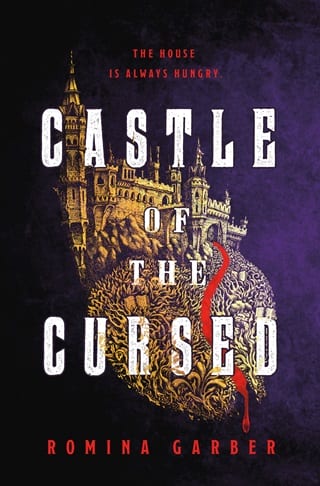Chapter 2
CHAPTER 2
6 MONTHS AGO
"A CAR'S COME FOR YOU, ESTELITA."
I look up from my notepad at Nurse Leticia framed in the doorway.
My first day at the center, the staff greeted me solemnly and with some trepidation, offering me pity and condolences—except Nurse Leticia. Or Lety, as she asks us to call her. You're less alone than you feel were her first words, delivered to me with a smile.
My roommate, Bebe, peeks in from behind the nurse. She only comes to our room at night, when she thinks I'm asleep. Works for me, so I can spend my days crying in peace.
Grief is like climate change: the sobbing comes in cycles, bands of storms that roll in with little warning and uproot my thoughts. Little by little, I feel the pain transforming me into someone new.
"Here," says Nurse Leticia, setting down a pair of jeans and a button-down shirt at the edge of my bed. "These should be your size."
"Is it Agent Navarro?" I ask as I reach for the clothes and pull them on under the covers. "Has something happened? Is there news?"
"Ay, Estelita, always with the questions," she says as I work under the sheets to swap my cotton pants for the jeans. "Hurry, and you'll find out for yourself."
Bebe scampers away as the nurse turns to go. She only approached because she didn't want to miss the gossip.
The clothes are smaller than my old ones, so they fit better. I guess I haven't been eating as much as usual. When I get in the black SUV, I'm alone in the back seat. Agent Navarro didn't come.
She was the first FBI agent I spoke to after… what happened. She has a temperate warmth about her, like she thinks of her heart as an asset when solving a case and not as something that must be shut off. She reminds me a bit of Dad.
Since I'm a minor, legally my name should have never been released to the press, but a reporter uncovered my identity and printed it. Agent Navarro was so outraged on my behalf that she gave a quote to an outlet calling the journalist in question an " embarrassment to humanity. "
I've brought my notepad, and my tiny scrawl of case notes takes up every bit of space, the ink running in places where my tears have fallen. The staff at the center have given me limited television privileges to keep up with the news, as long as I show them I can handle it. They say the instant I prove otherwise, I'll get cut off from the investigation.
Through the tinted window, I watch the greenery of residential communities dull into the grays of downtown. The Rainbow Center is a treatment facility for children of the elite, like politicians, celebrities, and the wealthy. It's a place to get professional attention away from the public eye. The government is footing my bill, a sign they want to take care of me as much as they want to keep me close.
"Hey, Estela," says Agent Navarro as soon as I step out of the SUV. She's waiting for me on the street, as are some male faces I remember from a few weeks ago, when they first brought me to this building.
I hoped to prove to them I could be useful on the case by providing detailed accounts of every passenger, the kind of notes Dad would take when surveying a scene. Agent Navarro and the others were riveted by my observations… until I brought up the black smoke.
There wasn't a shred of evidence that supported the presence of a fire—nor any hint of a weapon or a culprit. That's when they informed me I was experiencing post-traumatic stress disorder and needed time to recover so I could see things more clearly.
As no family member stepped forth to claim me, I was declared a ward of the state and signed into the Rainbow Pediatric Mental Health Center in Washington, DC.
"Is there news?" I ask by way of greeting. "Do you have a suspect?"
"Let's go inside," she says, and I note a new stiffness in her tone. I follow the agents past security and metal detectors, and this time instead of being welcomed into the director's office as an American hero, I'm ushered into an interrogation room.
My throat goes dry the instant I slide into a chair and Agent Navarro sits across from me. No one else comes in with us.
Her bald mahogany head shines under the fluorescent lighting as she sets a paper bag on the table. "I thought we agreed to trust each other," she begins, and my stomach hardens in anticipation of what this is about. "You help me figure out what happened to your parents, and I try to keep you involved in the case."
"Right," I say, sitting up to catch the curveball she's about to throw.
"Then why did you tell me your dad was a cop in Los Angeles?"
I blink and my mind blanks. I was prepared for her to bring up anything—our nomadic lifestyle, extended family members, even taxes —but not this.
"He was," I assert when I find my voice. "For seven years."
"And yet there's no record of him ever being in the LAPD."
I feel the color drain from my face and the air retract from my lungs as the ground slips away from me. My dad's identity as a detective forms part of the foundation upon which I built my own sense of self. The universe can't take this from me, too.
"My dad was a c-cop."
I try to state it firmly, but my chin trembles on the last word.
Agent Navarro's expression cracks with a sympathy that I want to believe is real. "He was," she says, and I feel the breath rushing back into my chest. "Just not in this country. You don't have US residency. Your parents never filed the proper paperwork."
"I don't understand. I was born here." I sound defensive even to myself.
Agent Navarro doesn't answer. She just reaches inside the paper bag and pulls out three passports. They look like they were all issued by the same country.
The letters on the covers bleed together as my vision blurs, so I can't read them.
This can't be happening. My parents and I are— were —bonded by trust. We didn't keep secrets. There wasn't space for them in the Subaru.
Except about the past, whispers a small voice in my mind.
"Argentina," I say at last. I sound choked, like there's something caught in my throat.
"No."
"What?" I blink in surprise, spraying my cheeks with tears.
"You're from Spain."
Agent Navarro stands up, abandoning me to my stupor as she goes to confer with unseen agents.
I can barely catch my breath, but I need to corral my thoughts if I'm going to figure out what's going on. Did they bring me in because they suspect my family? Or me ? That doesn't make sense. What was our weapon? Our motive?
They must be deporting me! I'm no longer the United States's problem—
The door clicks as Agent Navarro comes back in. Seated across from me again, she says, "I believe you didn't know any of this."
"Do I have family left?" I ask, hoping I won't wind up in some Spanish foster care program before I'm thrown out on the street.
"We've reached out to Spanish agencies to try locating relatives," she answers in a lighter tone. "Until we know more, nothing changes. You will remain where you are until the doctors say you're ready to be discharged. This country is the only home you know, and we are not about to abandon you."
I hear my exhale, but I don't suck in new air. She's gone from cold to overly friendly, and the fake charm doesn't work for her, like tasting a saccharine treat. "You want something," I say as it dawns on me.
Agent Navarro's eyebrows arch in surprise, and she sizes me up like she's evaluating me anew.
"What is it?" I ask, impatience getting the best of me.
She links her hands together on the table, her gaze never straying from mine. "We need you to stand at a press conference."
I don't like them, but I stood at plenty of those a couple of weeks ago. Once my identity was released, the government was quick to turn me into the public face of the tragedy. "What do I have to say?"
"Absolutely nothing. You are not to speak."
The instruction makes me a little queasy, but I don't disagree because I prefer not to participate.
Soon after, I'm led into a space where the press is congregated in front of the FBI director and other top figures. I'm steered right to the director's side, and he places a large hand on my shoulder, beaming.
I look around at the gathered reporters and tap into an electric current of anticipation. The government must be making a major announcement.
"One month ago today, twenty-six people boarded a subway train," says the director solemnly. "At 4:06 p.m., something happened in one of the com partments that stopped twenty-five people's hearts at the same time. It happened in New York, but it didn't just happen to New Yorkers. It happened to America. It happened to the world."
He looks down and gives me a solemn nod. His words weave wonder into the air, and the surrounding silence is so thick that camera clicks echo like bombs.
I wait with bated breath like everyone else. It feels like the whole world has been salivating for a villain, somewhere to place the blame for the Subway 25. Last week, Germany publicly offered to send their best investigators to help our law enforcement. As a third of the victims were their citizens, many countries believe them to have a strong claim. Is that why the FBI feels compelled to make an announcement now?
"Today, we can reveal what caused the deaths of those twenty-five passengers."
Gasps erupt across the room, including my own. I can't breathe, blink, think. It's like every part of me just sprouted ears.
"After reviewing the evidence, we can confirm this was not a terrorist plot, nor was it an attack at all. The subway line in question is the oldest in operation, and the city of New York has been systematically decommissioning these trains over time, as new ones come in to replace them. This particular train was an older model, and unfortunately one compartment suffered a lethal gas leak."
A gas leak? I don't understand. Then why didn't I die?
"It's thanks to Estela's testimony we were able to put it together." The director squeezes my shoulder. "She saw a man cough blood into a handkerchief just moments before everyone became afflicted. Estela suffered some minor hallucinogenic effects, but she did not breathe in enough of the gas for it to be fatal. For now, she is still recovering and under medical supervision, so she will not be taking questions."
He looks down at me again and says, "The whole country—the whole world —grieves with you, Estela. We thank you for your help in finding the cause of this tragedy."
I feel my jaw drop open.
I want to shout: HE'S LYING!
The government just made up their own version of what happened, based on facts they can fathom. A story they can control. If this version of events is accepted, we're never going to get real answers.
I need to say something.
Agent Navarro's hand grips my shoulder. I want to cry out, shake my head, speak . But I'm distracted by the tiny voice in my mind asking: Are you sure?
And then there's the question others will invariably ask: Do you have a better theory?
Before I can decide what to do, Agent Navarro guides me away. I keep trying to speak, but words won't come.
When the SUV drops me off at the center, the old me stays behind.
I abandon everything in that back seat—my notepad, my hope for answers, and my voice.
THE VOID
ESTELA STOPS SPEAKING.
And she knits herself a shroud from the silence.
She is told she suffers from PTSD, survivor's guilt, generalized anxiety disorder, clinical depression, and more. They give her drugs that help soften the edges of the world around her, but they don't dampen its colors. Or the past. Or the pain.
The world can't get quiet enough.
Her own face mocks her everywhere. On the nurses' phone screens when they think she isn't looking. On the rec room's television, until the staff spy her and change the channel. On the pages of newspapers and magazines reserved for more privileged patients.
She used to be one of those special people, until she stopped speaking. They say she has "shut down." She is absent, untreatable, a worst-case scenario. She has become an empty shell.
Estela has lost interest in everything. She has shed her form and exists outside of time and space. She can't fathom why her body is still here when she is not.
She wishes to disappear completely into the void of her mind… But a venomous voice keeps pulling her out.
"There was another story on your parents today."
The voice belongs to her roommate. Bebe is a teen actress of some note, and she was the center's biggest celebrity until Estela's arrival.
"Did you know they were here illegally?" Bebe prods. "Does that mean you're here illegally?"
Every night, as Estela lies in bed, longing to drift to sleep, Bebe's voice whispers fresh nightmares into the dark.
"Some people say your parents were behind the attack, and they sacrificed themselves on purpose. They think you're radicalized, too, and that's why the government is hiding you. Imagine if they knew you were here."
Once, Bebe brings Estela an artifact from the outside world. It's only a scrap of paper, but it feels like lead in her hand.
The torn piece of newsprint reads:
Sources say Estela Amador is being treated for severe mental health issues resulting from the gas she inhaled. A government agent who spoke on the condition of anonymity says when she turns eighteen, she will graduate to an adult facility. He doubts she will ever be released.
Estela wants to forget the scrap of paper, but she can't.
Words haunt, but objects exert gravity. They ensnare. Now she can never get lost in her mind's depths. The world will never get quiet enough.
Not without an intervention.
She knows the nurses' schedules. She's memorized the passcode to the drug dispensary. She always marks her escape routes.
Tonight, the world will be as silent as Estela.
She wakes up in a hospital bed.
Estela has been placed on a seventy-two-hour watch. She is given heavy doses of antidepressants.
When she returns to her assigned room, Bebe does not speak to her anymore.
Weeks pass, and Estela keeps up her silent vigil. She watches other patients improve with a regimen of therapy and medication, but no matter how the doctors adjust her dosage, all she feels is brain fog.
And she welcomes it.
In this state, she drifts closer and closer to the void of her mind. Slow and semi-sedated, she can't focus. She can't make plans. She can't remember.
Then the letter arrives.
 Fullepub
Fullepub 



